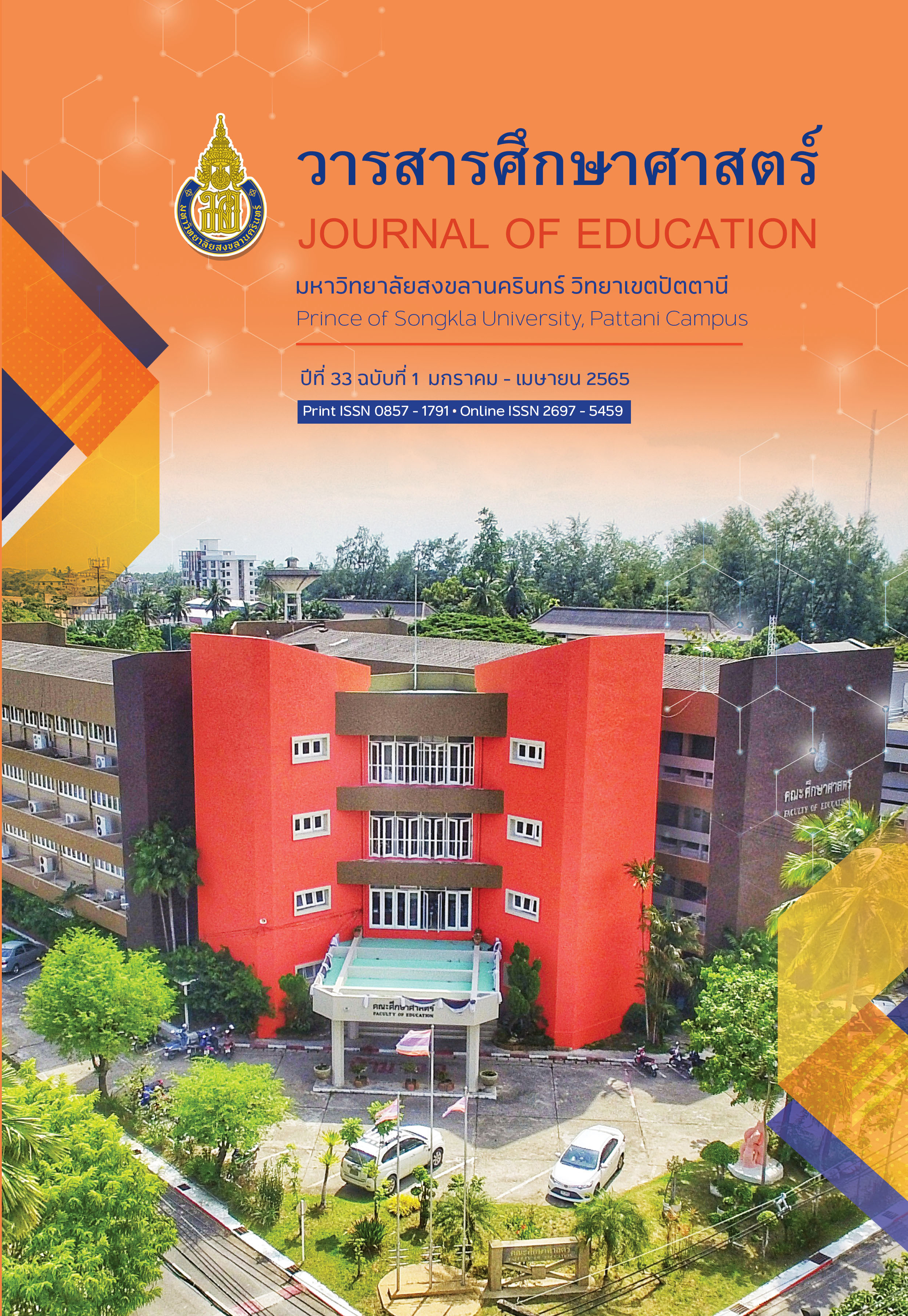การพัฒนาทักษะการสื่อสารของนักศึกษาระดับปริญญาตรี โดยใช้เกมเป็นฐานร่วมกับแอปพลิเคชัน Google Classroom เพื่อให้ผลสะท้อนกลับ
Main Article Content
บทคัดย่อ
การวิจัยครั้งนี้มีวัตถุประสงค์ คือ 1) เพื่อพัฒนาทักษะการสื่อสารของนักศึกษาระดับปริญญาตรี โดยใช้การจัดการเรียนรู้แบบใช้เกมเป็นฐาน และ 2) เพื่อเปรียบเทียบความสามารถในการสื่อสารของนักศึกษาระดับปริญญาตรี ระหว่างการใช้การจัดการเรียนการสอนแบบใช้เกมเป็นฐาน ร่วมกับการใช้แอปพลิเคชัน Google Classroom และการใช้การจัดการเรียนการสอนแบบใช้เกมเป็นฐานร่วมกับการใช้แอปพลิเคชัน Google Classroom และการให้ผลสะท้อนกลับ กลุ่มตัวอย่างที่ใช้ในการศึกษา ได้แก่ นักศึกษาระดับปริญญาตรีชั้นปีที่ 1 มหาวิทยาลัยสวนดุสิต จำนวน 2 ตอนเรียน ทั้งหมด 80 คน โดยแบ่งออกเป็นกลุ่มทดลองด้วยรูปแบบที่ 1 จำนวน 40 คน และกลุ่มทดลองด้วยรูปแบบที่ 2 จำนวน 40 คน ใช้วิธีการสุ่มกลุ่มตัวอย่างแบบกลุ่ม (Cluster sampling)
ผลการวิจัยพบว่า 1) ผลการจัดการเรียนรู้ของกลุ่มทดลอง 2 กลุ่ม มีผลการเรียนรู้หลังเรียนสูงกว่าผลการเรียนรู้ก่อนเรียน อย่างมีนัยสำคัญทางสถิติที่ 0.05 2) ผลการเปรียบเทียบความสามารถในการสื่อสารของนักศึกษา 2 กลุ่ม พบว่า กลุ่มทดลองที่ 2 ซึ่งใช้รูปแบบการพัฒนาทักษะการสื่อสารภาษาไทยของนักศึกษาระดับชั้นปีที่ 1 โดยใช้การจัดการเรียนการสอนแบบใช้เกมเป็นฐาน ร่วมกับการใช้แอปพลิเคชัน Google Classroom และการให้ผลสะท้อนกลับ มีประสิทธิภาพในการสื่อสารด้านการฟังและด้านการพูด สูงกว่ากลุ่มทดลองที่ 1 ซึ่งใช้รูปแบบการพัฒนาทักษะการสื่อสารภาษาไทยของนักศึกษาระดับชั้นปีที่ 1 โดยใช้การจัดการเรียนการสอนแบบใช้เกมเป็นฐาน ร่วมกับการใช้แอปพลิเคชัน Google Classroom
Article Details

อนุญาตภายใต้เงื่อนไข Creative Commons Attribution-NonCommercial 4.0 International License.
เอกสารอ้างอิง
Announcement of the Ministry of Education. (2018). Subject: Higher education standards 2018,. [in Thai]
Barzilai, S., and Blau, I.,. (2014). Scaffolding game-based learning: Impact on learning achievements, perceived learning, and game experiences. Computers & Education, 70, 65-79.
Boboc, A. L., Orzan, G., Stoica, I. M., & Niculescu-Ciocan, C.,. (2018). Gamification and GameBased Learning - a Solution for Romanian Education System? Paper presented at the The 14th International Scientific Conference eLearning and Software for Education Bucharest, Carol I National Defence University.
Brookhart, S. M. (2008). How to give effective feedback to your students. USA: ASCD.Committee of Thai Language for Communication. (2012). Thai language for communication. Bangkok: Kasetsart University Press. [in Thai]
Davis, B. C. (2018). Game-Based Learning for Values-Driven Leadership Education. (Doctor of Philosophy in Values-Driven Leadership), Benedictine University,
Faculty of Mahachulalongkornrajavidyalaya University faculty. (2008). Language and Communication. Bangkok: Mahachulalongkornrajavidyalaya University. [in Thai]
Freitas, S. D. (2006). Learning in Immersive worlds: a review of game-based learning. UK: JISC.
Hepplestone, S., et al.,. (2011). Using technology to encourage student engagement with feedback: a literature review. Research in Learning Technology, 19(2), 117-127.
Hirumi, A., Appelman, B., Rieber, L., and Eck, R.V.,. (2010). Preparing Instructional Designers for Game-Based Learning : Part 2. TechTrends, 54(4), 19-27.
Jakkaew, P., and Hemrungrote, S.,. (2017). The use of UTAUT2 Model for understanding student perceptions using google classroom: a case study of introduction to informaion technology coures. Paper presented at the 2017 International Conference on Digital Arts, Media and Technology (ICDAMT), Chiang Mai, Thailand.
Jug, R. e. a. (2019). Giving and receiving effective feedback: a review article and how - to guide. Arch pathol lab med, 143.
Kapp, K. M. (2012). The gamification of learning and instruction: Game-based methods and strategies for training and education. San Francisco: CA L Pfeiffer.
Kapp, M., Blair, L., and Mesch, R.,. (2014). The gamification of learning and instruction fieldbook idea into practice. CA: Wiley.
Khamphoomsri, Y. et al. (2017). Classroom Transition to Proactive Learning by Process Method in Industrial Engineering Courses. Journal of Learning Innovations Walailak University, 3(1), 5-28. [in Thai]
Kolb, A. Y., and Kolb, D.A.,. (2010). Learning to play, playing to learn : A case study of a ludic learning space. Journal of Organizational Change Management, 23(1), 26-50.
Laryea, S. (2013). Feedback provision and use in teaching and learning: a case study. Education+Training, 55(7), 665-680.
Liu, C. H. A., Ho, C-T.B., and Tan, K.H.,. (2009). The application of management simulation and game teaching in Taiwan and Australia. On the Horizon, 17(4), 397-407.
Logofatu, M., Dumitrache, A., and Gheorghe, M.,. (2010). Game-Based Learning in Education. Paper presented at the International Conference "Education Facing Contemporary World Issues", Romania.
Lumthong, D. (2012). Effects of feedback forms on visual art development: application of general feedback and recommendations for improvement. (Master of Education), Chulalongkorn University. [in Thai]
Meyer, B. (2013). Game-Based Language Learning for Pre-School Children: A Design Perspective. Electronic Journal of e-learning Volume, 11(1), 40-48.
Nakasan, N. & Nakasan, C. (2016). Game: Innovation for Creative Education. Romyuk Journal Krirk University, 34(3), 160-182.
http://nueducation2556.blogspot.com/2014/02/blended-learning-21.html [in Thai]
Petcharat, J., & Thong Bai, A. (2012). Thai for Communication. Bangkok: O. S. Printing House. [in Thai]
Pinyoyang, W. (2013). Marketing ideas. Bangkok: Bangkok Business. [in Thai]
Poolphuttha, A. (2017). A model for providing feedback to enhance classroom research competency of teachers in the teaching experience experience. Journal of Social Sciences and Research Mahasarakham Rajabhat University, 13(37), 61-74. [in Thai]
Pounder, E. (2009). A framework for effective feedback for non-native learners of English wriring. Education, Business and Society, 2(3), 174-180.
Puthyrom, T., Suwanna, S., and Suriyoung, L.,. (2017). A game-based learning approach to improve students' learning achievement in data flow diagram course. Phranakhon Rajabhat Research Journal (Humanities and Social Sciences), 12(2), 1-9.
Ruengrong, P. et al. (2014). Blended Learning and the development of Thai education
quality in the 21st century. Retrieved from
Sathornsamritphol, S. (2011). Thai language 1. Bangkok : Triple Education. [in Thai]
Sathornsamritphol, S. (2015). Thai language for communication. Bangkok: Triple Education. [in Thai]
Shaharanee, I. N. M., Jamil, J.M., and Rodzi, S.S.M.,. (2016). The application of google classroom as a tool for teaching and learning. Journal of telecommunication, electronic and computer engineering, 8(10), 5-8.
Simoes, J., Redondo, R.D., and Vilas, A.F.,. (2013). A social gamification framework for a K-6 learning platform. Computer in Human Behavior, 29(2), 345-353.
Someprayoon, W. (2010). Thai language teaching. Bangkok: Dok Ya academic. [in Thai]
Suebsom, K. & Mheeplat, N. (2017). The Development of a Flipped classroom with the Integration of Multimedia Classroom Teaching through Google Classroom. Association of private higher education institutions of Thailand under the Patronage of her royal highness Patronage of her royal highness princess mahachakri sirindhorn, 6(2),118-127. [in Thai]
Sukcharoen, N. & Apikoonwarasit, P. (2014). Creative online feedback training to promote teachers' technological skills. Boromarajonani College of Nursing, Nakhon Ratchasima, 14(2), 211-229. [in Thai]
Sung, H.-Y., et al.,. (2017). Experiencing the Analects of Confucius : An experiential game-based learning approach to promoting students' motivation and conception of learning. Computers & Education, 110, 143-153.
Teed, R. (2016). Game-Based Learning. Retrieved from http://serc.carleton.edu/introgeo/games/whatis.html
Vos, L., and Brennan, R.,. (2010). Marketing simulation games: student and lexturer perspective. Markering Intelligence & Planning, 28(7), 882-897.
Watson, R. (2012). 50 ideas you really need to know the future. London: Quercus.
Wiriyawarakoon, P. & Poenak, D. (2015). Google Apps for Education, digital education innovation. SDU. journal, Humanities and Social Sciences, 7(3), 103-111. [in Thai]
Wongwanich, S. (2007). Needs assessment research. Bangkok: Chulalongkorn University Printing House. [in Thai]


